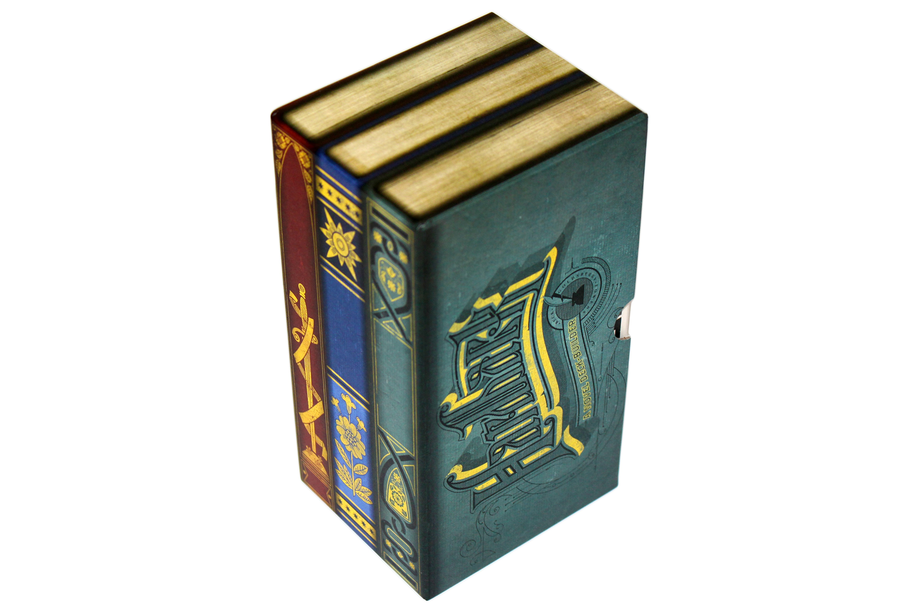This week’s game is one I personally had been very much looking forward to play.
Deck-builders are a favoured in terms of core mechanic, and I particularly appreciate deck-builders which offer something different using the idea of building your persona; deck of cards as the game progresses.
Enter Hardback, a game by Jeff Beck and Tim Fowers.
Hardback is a deck-building word game.
“As an aspiring 19th Century novelist, you work to pen your next masterpiece, earning prestige along the way,” details the rulebook fluff. “You start with your own personal deck of cards, using them to acquire new cards, and reshuffle your deck throughout the game. Specialize your deck in certain genres to exploit card combinations, and press your luck to draw extra cards – but make sure you can still string a word together.
“You’re paid by the word to complete romance, mystery, adventure and horror novels, earning prestige in the process. Earn enough to complete your masterpiece and be recognized as the finest novelist of the age.”
If it sounds a bit like a deck-builder meets Scrabble, you are not too far off, although there are a few extra things going on with Hardback.
Each player starts with eight starting ‘purchase cards’, each providing a one cent coin to use to purchase additional cards. As well the starting cards consist of the letters: A, E, I, L, N, R, S, T, used in spelling words.
Most cards have additional game elements as well. The instructions above the line on a card are its basic benefits, which apply each time you play the card.
The instructions below the line on a card are its ‘Genre Benefits’, which apply only when you use multiple cards of the same genre at the same time, e.i. horror or mystery or romance. Genre benefits are provided in addition to the basic benefits of a card; they don’t replace a card’s basic benefits.
So on a turn you will end up wanting to spell a word. It is not as challenging as it might seem, although scoring big points from it can be.
To start, if you are struggling to make a word, you can ask for help from other players.
If you request a ghost writer, display your cards for all players to see. Your turn continues normally. If another player suggests a word that you decide to use, that player receives a free ‘Ink token’ from the general supply. Ink tokens can be a real benefit as will be explained later.
Also, if you can’t spell a word, you may choose to pass your turn. If you pass, discard your cards and draw your next hand.
As for ink tokens, you may purchase one at the cost of one cent each. They may be used in two ways.
“One Ink token can be spent to press your luck and draw an additional card. At any time before you spell a word, even during another player’s turn, you can draw additional cards from your draw pile by spending one Ink token per card. When you draw a card this way, place it face-up in front of you and place the Ink token you spent on the card. Doing so reminds all players that this card was drawn using Ink,” details the rules.
You must use all cards with Ink tokens on them in your next word. Cards with Ink tokens on them cannot be turned face-down and made wild.
Pressing your luck with Ink tokens is the only way to draw additional cards in Hardback.
There are also what I term ‘whiteout’ but the game calls Remover tokens which have the unique ability to cancel out an Ink token on an additional card drawn.
“When you have a card in front of you with an Ink token on it, you can spend a Remover token to discard the card’s Ink token and add that card to your hand. The card is now treated as a normal card; you can choose whether or not to use it in your word and whether or not to make it wild. You can only get Remover tokens by playing certain cards, not by purchasing the tokens. After you spend a Remover token, return it and the canceled Ink to the general supply,” notes the rules.
I love the game in terms of how it uses the deck-building mechanic, which is unique and most definitely fun as you search out words.
On game play this is an easy top-10 deck-builder, but it ends up rated much lower because our experience suggests if someone pops out to even a few point lead early on they are all but guaranteed to stay in the lead. It’s difficult not to manage a few points every turn, but getting a really big score to make a comeback is much harder. So an early lead just seems to hold throughout a game, which makes late game play especially anticlimactic. So close to a home run, but it dies at the warning track, to use a baseball analogy.
Check it out at www.fowers.games
Thanks to fellow gamers Trevor Lyons, Jeff Chasse, and Adam Daniels for their help in running through this game for review.



